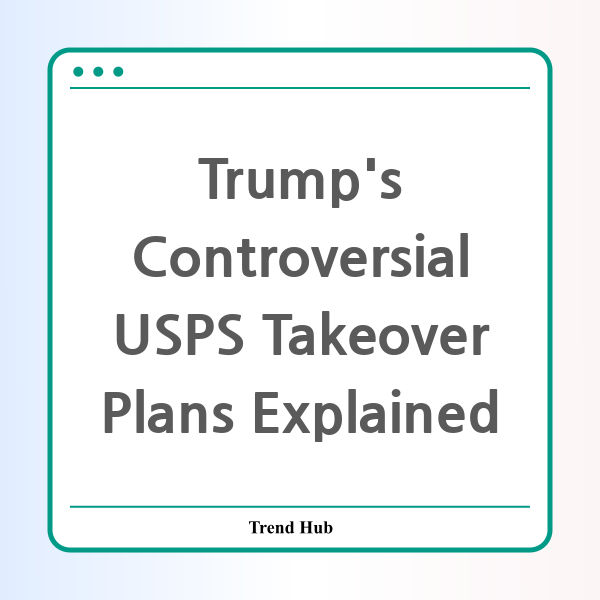* This website participates in the Amazon Affiliate Program and earns from qualifying purchases.

Could the United States Postal Service (USPS) be facing an unprecedented takeover? With President Trump reportedly planning to dissolve its governing board and bring the agency under direct control of his administration, the future of this essential service is teetering on the brink of chaos. But what does this mean for the postal service that has been a cornerstone of American society for over 250 years?
The U.S. Postal Service has long enjoyed a reputation as one of the most trusted public institutions in the country. However, recent developments suggest that this venerable agency might soon find itself at the center of a political storm. According to insiders, Trump is set to issue an executive order aimed at firing the members of the Postal Service’s governing board and transferring control of the agency to the Commerce Department.
Speculations indicate that Howard Lutnick, a billionaire and the CEO of a major financial services company, would oversee this transition. This move is expected to ignite fierce opposition from the Postal Service’s governing board, which is preparing to take legal action to protect its independence and maintain its essential role in American life. In an emergency meeting, the board has hired outside counsel and is considering a lawsuit if Trump attempts to remove its members or curtail the agency’s autonomy.
Trump's history with the USPS is rocky; he has previously attempted to privatize the agency, a notion that has drawn criticism from various quarters, including labor unions and political analysts. Critics argue that privatization could undermine the Postal Service's mission to deliver mail to every American household, regardless of location. Moreover, concerns have been raised that this move could lead to increased costs for consumers and diminished services, particularly impacting rural communities that rely heavily on the Postal Service.
The American Postal Workers Union has labeled the potential takeover “outrageous,” asserting that it represents an unlawful attack on a national treasure that was established in the U.S. Constitution. Their concerns highlight the precarious position in which the Postal Service finds itself, caught between political ambitions and the fundamental needs of the public.
The Postal Service's governing board is composed of bipartisan members who are appointed by the President and confirmed by the Senate. This structure is designed to ensure a degree of independence from the political whims of any administration. However, the current political climate suggests that this independence is under severe threat. Experts warn that any attempt to forcibly align the Postal Service under the Commerce Department could violate federal law, illustrating just how serious the situation has become.
As the Postal Service embarks on a 10-year modernization plan to improve efficiency and financial viability, the looming specter of a takeover raises questions about the agency’s future. The initiative is aimed at addressing financial instability and improving on-time delivery—a critical factor for patrons relying on timely mail services. While Trump’s administration argues that such drastic measures are necessary for reform, the ensuing default could create significant disruptions in service and undermine public trust.
The stakes are high, not just for postal workers but for the millions of Americans dependent on the Postal Service to deliver mail, medications, and essential goods. With accusations of billionaire interests aiming to compromise a public institution for profit, the battle over the future of USPS is far from over. As the situation develops, it is crucial for citizens to stay informed and engaged, as the implications of these decisions could resonate throughout the country for generations to come.
In summary, the potential takeover of the USPS under Trump's administration raises numerous concerns that touch on legality, public service accessibility, and the future of a vital institution. As debates heat up and legal battles loom, the American public must consider what this means for their access to postal services and the long-standing values that the USPS has come to represent.
* This website participates in the Amazon Affiliate Program and earns from qualifying purchases.